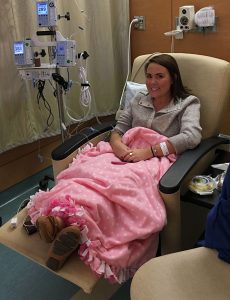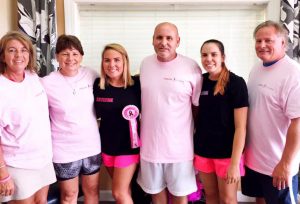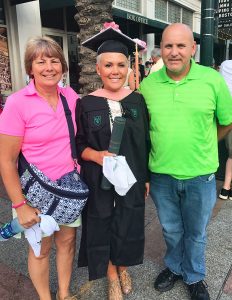Patient Stories: Brenda Hensley
Parent of a Breast Cancer Survivor – Their role in the battle.
 “I feel guilty. As a parent, I feel guilty that I’m healthy and she’s not.” Brenda Hensley, a 54-year-old elementary school teacher in Jacksonville, North Carolina shares her feelings about what it was like when her daughter, Krystle, was diagnosed with cancer. “We have the same genetic makeup, but she got cancer, and I didn’t. I know I will have to live with the fact that my genes were passed down to my baby girl, forcing her to fight for her physical and mental life, causing her to lose friendships, lose her hair, and lose her ability to bear children.”
“I feel guilty. As a parent, I feel guilty that I’m healthy and she’s not.” Brenda Hensley, a 54-year-old elementary school teacher in Jacksonville, North Carolina shares her feelings about what it was like when her daughter, Krystle, was diagnosed with cancer. “We have the same genetic makeup, but she got cancer, and I didn’t. I know I will have to live with the fact that my genes were passed down to my baby girl, forcing her to fight for her physical and mental life, causing her to lose friendships, lose her hair, and lose her ability to bear children.”
Cancer is not just one person’s journey, its tendrils wrap around others, weaving into the fabric of their lives. Many parents have their own story to tell as they stand on the sidelines, holding their child’s hand through the surgery, chemotherapy, radiation, and afterward during the recovery.
Brenda’s history with breast cancer started many years before her daughter was even born. Her mother was diagnosed when she was in high school. She underwent surgery and was cancer free for several years before it reappeared, eventually claiming her life when Brenda was just 26 years old. Breast cancer continued to be a deadly disease on her maternal side killing her grandmother, aunt, and 26-year-old cousin. Her cousin was a young woman who felt a lump in her breast, but doctors at the time assumed she was too young to develop the disease; by the time she had a mammogram, cancer had spread to her bones.
Over the years cancer would crop up here and there in their family tree, but it was never so much at the forefront as it was when in 2016, Brenda’s daughter came to her with the concern that she had felt a lump. “I said the most dreaded words, words I will never say again to another human being; I told her everything was going to be ok. And in truth, it wasn’t. My oldest daughter got the call that she had stage 1 breast cancer. As a tight-knit family, we knew we wanted to have Krystle close by for her care so that we could be there for her. She continued grad school at Tulane but did so remotely so she could come home and get her care at UNC Healthcare.”
“I will never forget speaking to Damien Brodie, the intake specialist who answered the phone at the UNC Healthcare Medical Campus. He made me feel like we mattered like we were the most important patients and that Krystle was their #1 priority. After speaking with him, there was no question for us; UNC Healthcare was where we wanted to send her. My daughter wasn’t even back in the state of North Carolina yet, and we had an appointment for her to see a breast oncologist.”
 Brenda and her husband, Carroll, sat beside Krystle at each of her appointments, listening to her doctors explain the illness, her options and what to expect. “I couldn’t ask for a better experience. Not only were they [the doctors] there for my daughter, they were there for us. They answered all of her questions and ours. They realized our drive was a distance so they would schedule our appointments with that in mind. This thoughtfulness didn’t just extend to her, the patient, and us, her parents, but really to the whole family. At the very first appointment, my youngest daughter was with us, and they questioned her too, asking if she’d been tested. It wasn’t just a patient type of care but a whole family type of care.”
Brenda and her husband, Carroll, sat beside Krystle at each of her appointments, listening to her doctors explain the illness, her options and what to expect. “I couldn’t ask for a better experience. Not only were they [the doctors] there for my daughter, they were there for us. They answered all of her questions and ours. They realized our drive was a distance so they would schedule our appointments with that in mind. This thoughtfulness didn’t just extend to her, the patient, and us, her parents, but really to the whole family. At the very first appointment, my youngest daughter was with us, and they questioned her too, asking if she’d been tested. It wasn’t just a patient type of care but a whole family type of care.”
After Krystle’s test for the BRCA1 gene mutation, Brenda, and her youngest daughter, Catheryn was also encouraged to undergo testing. Just as Krystle had tested positive for the BRCA1+ gene mutation, so had Brenda. However, (sister) test came back negative. “I will never forget what Krystle said to me when her sister’s test came back. She said ‘Mom, if it had to happen to one of us I’m glad it was me.’ She amazes me, but I still find it hard to balance all of it. One of my children is breastfeeding a baby, possibly right at this moment, and the other one may never be able to do that, and it’s heartbreaking because that choice is out of her hands.”
During their consultations, Krystle mapped out her treatment plan with her doctors. With her family’s support, she underwent the first step, which included a mastectomy combined with immediate reconstructive surgery. Her parents supported her through each stage of her journey, many times driving with her the three hours from Jacksonville to Chapel Hill for her treatments.
“After the surgery when our daughter was in recovery, we were at the hospital food court, and we saw Dr. Gallagher leaving, still dressed in her scrubs. She stopped to talk with us and provide words of encouragement. I just had to hug her. I never felt Krystle was a ‘lab rat.’ That’s how I felt with my mother near the end of her life like she was a test subject and it was horrible to watch. At UNC Healthcare I never felt any of their suggestions or treatments for Krystle were for the sake of learning, it was to save her life.”
Once the surgery was complete, Krystle worked with her fertility team. She had her eggs harvested so that one day she might be able to have children of her own. “It may not have happened,” Brenda explains, “Krystle originally didn’t want to meet with the fertility specialist; she felt it was going to be too expensive of a procedure. But her breast oncologist Dr. Gallagher was persistent in her determination to get Krystle to at least speak with them. Her team at UNC Healthcare came through; they recommended she reach out to the non-profit Live Strong. In the end, they helped to cover Krystle’s cost for the IVF and egg harvesting, giving her the opportunity for children of her own that might otherwise have been unattainable.”
After getting her eggs harvested, Krystle began her chemotherapy radiation. She remained upbeat even as her hair fell out, people she had called friends walked away from her, and the treatment eventually caused her body to go through early onset menopause. Six months after getting the news that her daughter had breast cancer, Brenda and the family rejoiced that Krystle was in remission. There was, however, a darker side to recovery that Brenda hadn’t anticipated. While cancer may no longer be in her body, it has lasting effects that survivors mentally work through day in and day out.
Brenda talks about Krystle’s recovery: “The psychological element is a dark side of the disease that isn’t exposed to the light much. Krystle remained positive and happy through much of her treatment. But the effects of a diagnosis like this come with a mental battle, an underlying sadness, and depression. One that, as a parent, is the hardest thing because I didn’t know what to do for her but just to encourage and be there for her. She is more than a survivor she’s a fighter; she inspires me especially in the decisions I’m making about my future.”
 With her BRCA1+ test results in mind, Brenda’s journey continues this fall when she will undergo surgery for a hysterectomy, removing her uterus & ovaries. While she is currently cancer free, she decided in collaboration with her doctor’s advice, knowing that ovarian cancer is the next highest level that comes with the BRCA1+ mutation. As for Krystle, she will begin Law School soon. The journey of the Hensley women lives on as they learn to deal with the genes that life has presented.
With her BRCA1+ test results in mind, Brenda’s journey continues this fall when she will undergo surgery for a hysterectomy, removing her uterus & ovaries. While she is currently cancer free, she decided in collaboration with her doctor’s advice, knowing that ovarian cancer is the next highest level that comes with the BRCA1+ mutation. As for Krystle, she will begin Law School soon. The journey of the Hensley women lives on as they learn to deal with the genes that life has presented.
